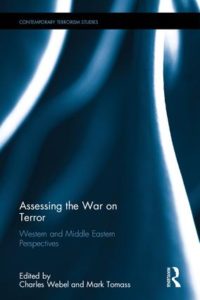Assessing the War on Terror
REVIEWS, 27 Feb 2017
Edited by Charles Webel and Mark Tomass – TRANSCEND Media Service
This volume is a collection of articles that critically examine the efficacy, ethics, and impact of the War on Terror as it has evolved since 9/11. © 2017 – Routledge
 During the decade and a half of the Global War on Terror (GWOT), numerous books have considered the political, psychosocial, and economic impacts of terrorism. However, there has been little systematic effort to examine the effectiveness of the GWOT in achieving its goals. Furthermore, there is virtually nothing that presents a comparative analysis of the GWOT by the people most directly affected by it—citizens and scholars from conflict zones in the Middle East.
During the decade and a half of the Global War on Terror (GWOT), numerous books have considered the political, psychosocial, and economic impacts of terrorism. However, there has been little systematic effort to examine the effectiveness of the GWOT in achieving its goals. Furthermore, there is virtually nothing that presents a comparative analysis of the GWOT by the people most directly affected by it—citizens and scholars from conflict zones in the Middle East.
There is, therefore, great need for a book that analyzes the strategies, tactics, and outcomes of the GWOT and that also presents facts and ideas that are missing or underrepresented in the dominant public narratives. The contributions in this volume were chosen to specifically address this need. In doing so, it uniquely provides not only Western perspectives of the GWOT, but also importantly includes perspectives from the Middle East and those most directly affected by it, including contributions from scholars and policy makers.
Overall, the contributions demonstrate how views differ based on geographical location, and how views have changed during the course of the still-evolving War on Terror.
The book will be of much interest to students and scholars of terrorism and counter-terrorism, foreign policy, Middle Eastern politics, security studies and IR, as well as policy makers.
**********************
‘This impressive work demonstrates that the Global War On Terror (GWOT) is both ineffective and inhumane, and that there are better, more ethical ways to deal with political violence. Especially praiseworthy is the variety of voices the book contains: prominent academics and activists, as well as victims. It should be required reading for anyone seeking a critical understanding of our present dilemma.’ — Charles Lindholm, Boston University, USA
‘This is a timely work that combines insight with style. It offers a fine example of engaged scholarship. It is a book well worth reading!’ — Stephen Eric Bronner, Rutgers University, USA
______________________________________
Contributors: Johan Galtung, Noam Chomsky, Oliver Richmond, Ioannis Tellidis, Sarton Weinraub, Buthaina Shaaban, Anwar Said al-Haidari, Sher M. Khan, John Arnaldi, William Cohn, Laurie Calhoun, Scott Atran, Casey Douglas Carr and Audrey Kurth Cronin.
Charles Webel is a member of the TRANSCEND Network for Peace, Development and Environment, currently Professor and Dept. Chair of Peace Studies at Chapman University in Orange, CA. He previously studied and taught at Harvard and U.C. Berkeley, where he got his Ph.D. A four-time Fulbright Scholar, most recently in Myanmar, he has published 8 books and has been active in progressive peace and social justice movements since his teen-age days in New York.
Mark Tomass is an economist and instructor at Harvard University, USA, and author of The Religious Roots of the Syrian Conflict: The Remaking of the Fertile Crescent (2016).
Go to Original – routledge.com
DISCLAIMER: The statements, views and opinions expressed in pieces republished here are solely those of the authors and do not necessarily represent those of TMS. In accordance with title 17 U.S.C. section 107, this material is distributed without profit to those who have expressed a prior interest in receiving the included information for research and educational purposes. TMS has no affiliation whatsoever with the originator of this article nor is TMS endorsed or sponsored by the originator. “GO TO ORIGINAL” links are provided as a convenience to our readers and allow for verification of authenticity. However, as originating pages are often updated by their originating host sites, the versions posted may not match the versions our readers view when clicking the “GO TO ORIGINAL” links. This site contains copyrighted material the use of which has not always been specifically authorized by the copyright owner. We are making such material available in our efforts to advance understanding of environmental, political, human rights, economic, democracy, scientific, and social justice issues, etc. We believe this constitutes a ‘fair use’ of any such copyrighted material as provided for in section 107 of the US Copyright Law. In accordance with Title 17 U.S.C. Section 107, the material on this site is distributed without profit to those who have expressed a prior interest in receiving the included information for research and educational purposes. For more information go to: http://www.law.cornell.edu/uscode/17/107.shtml. If you wish to use copyrighted material from this site for purposes of your own that go beyond ‘fair use’, you must obtain permission from the copyright owner.